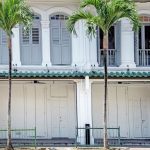UOB announces $3billion relief assistance especially for SMEs affected by Covid-19
By: Phoenix Lee/
 United Overseas Bank (UOB) on Feb 12 announced that it has allocated S$3 billion to provide companies, especially small- and medium-sized enterprises (SMEs), in Singapore with relief assistance to tide over the negative impact of the COVID-19 outbreak on their business.
United Overseas Bank (UOB) on Feb 12 announced that it has allocated S$3 billion to provide companies, especially small- and medium-sized enterprises (SMEs), in Singapore with relief assistance to tide over the negative impact of the COVID-19 outbreak on their business.
United Overseas Bank Limited (UOB) is a leading bank in Asia with a global network of more than 500 offices in 19 countries and territories in Asia Pacific, Europe and North America. Since its incorporation in 1935, UOB has grown organically and through a series of strategic acquisitions. UOB is rated among the world’s top banks: Aa1 by Moody’s and AA- by both Standard & Poor’s and Fitch Ratings. In Asia, UOB operates through its head office in Singapore and banking subsidiaries in China, Indonesia, Malaysia, Thailand and Vietnam, as well as branches and representative offices across the region.
UOB announces package to help corporate clients
In the face of the likely economic fallout and its impact on industries and businesses, UOB sees the need to help its corporate clients, in particular the SMEs, in addressing their near-term liquidity needs. The Bank’s relief measures aim to enable those affected companies, who have good track records and who have been servicing their repayments promptly, to have more flexibility in their cash flow management.
UOB announces relief assistance to cushion impact of Covid-19. Assistance especially targeted at small and medium sized enterprises.
Table of Contents
These measures include:
- allowing affected businesses to rework their principal repayments and to service only their loan
interest for up to one year; - extending up to one year working capital financing of up to S$5 million; and
- offering financing liquidity against mortgage security.
Mr Wee Ee Cheong, Deputy Chairman and Chief Executive Officer, UOB, said, “In these particularly trying times, the government, businesses and communities are doing their very best to overcome this immediate challenge. We at UOB want to play our part in our commitment to caring for our clients’ businesses. For most companies, especially the SMEs, cash flow and financing are key to them sustaining their business. As their long-term banking partner, we believe our added support can help alleviate the business disruption and pressure from the ripple effect of the epidemic.”
UOB announces plan also for retail customers
For its retail customers who are affected by the current circumstances, UOB will assess on a case-by-case basis how it can help them. The Bank is monitoring the situation and will take appropriate steps accordingly in support of its customers.
UOB announces assistance as reports suggests impact from Covid-19 is expected to be short-lived
The economic impact of the Coronavirus issue is expected to be short-lived based on the current situation, said a recent note from Cushman & Wakefield (C&W). The report said that the Singapore government has tried to put in place multiple lines of defence to minimize the chances of the virus spreading further.
Any disruption to market activity is expected to be short-lived and so the real estate impact will be minimal said Ms Christine Li, C&W’s Head of Research for South East Asia.
“Singapore, Singapore; held up by the country’s sound economic fundamentals. The impact will be mostly felt by the hospitality, retail and F&B sectors, with limited impact on both the office and industrial sectors as these are non-tourism related sectors. Corporates may delay decision making in the first quarter of 2020 as they focus on tactical issues around operations in China for the moment. This is expected to impact activity in the first quarter of 2020 against an office leasing market that has already been grappling with a slowdown arising from the US-China trade war.”
Although the real estate impact will be minimal, the impact on the hospitality sector is more immediate said the report.
“With millions in China under an effective lockdown and a ban on Chinese tour groups and travellers who have recently travelled to China, tourist arrivals especially from China are expected to slow in 1H 2020. Given that Chinese tourists make up about 20 per cent of Singapore’s international visitors with about 3.6 million visitors to Singapore in 2019, overall hotel RevPar is expected to see some downward pressure in the first half.
“The slow down in tourist arrivals will result in a decline in shopping spend by Chinese tourists, particularly retail trades and tourist destinations which cater to Chinese tourists. Chinese tourists were the top spenders in the first half of 2019, spending close to S$2 billion on shopping, accommodation, F&B, etc, with 51 per cent on shopping alone. As such, some of the more touristy shopping destinations mainly in Marina Bay Sands and Orchard locations could be affected if the travel ban and outbreak persists.”
As the real estate impact is expected to be minimal, landlords of major shopping centres are not under pressure to lower rents, especially if the overall situation improves in the next couple of weeks, said C&W.
“Typically, the well-managed shopping centres also have enough tenants in waiting to take up any vacancy that becomes available. So long as the virus remains at bay with no community spread, the temporary decline in footfalls at malls should recover over a short period of time.”
In the residential sector, there could be a slight impact on project launches as developers are likely to hold back new launches in view of the weaker sentiment, said C&W.
Ms Li said, “high-end luxury properties with more Chinese buyers could face slower take-up rates as viewings are expected to slow down in the midst of the outbreak. Again, the impact should still be contained as Singapore continues to be seen as a safe haven location amid heightened global uncertainties.”
She added, “liquidity is still aplenty and investors continue to search for yield in the real estate sector. Well-managed and well-located office and industrial assets will remain sought after by investors and occupiers who typically take a medium to long term view when they purchase or lease these properties.”






